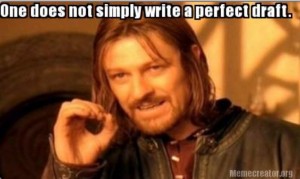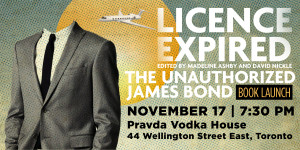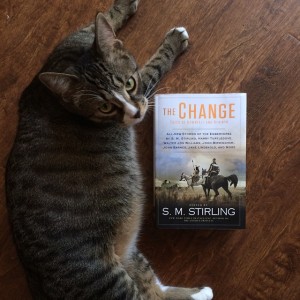 Every last soul reading this post could, if they chose, have 5,000 words of fiction up in some prominent e-bookstore by the end of this week. This is true too of feature journalism, epic poetry, creative non-fiction, film scripts, thinly veiled Raylan/Boyd Justified erotica, song lyrics, diary entries and stream of consciousness commandments for that new religion you’ve been meaning to think up.
Every last soul reading this post could, if they chose, have 5,000 words of fiction up in some prominent e-bookstore by the end of this week. This is true too of feature journalism, epic poetry, creative non-fiction, film scripts, thinly veiled Raylan/Boyd Justified erotica, song lyrics, diary entries and stream of consciousness commandments for that new religion you’ve been meaning to think up.
Step one would be typing 5K words of, seriously, whatever. Steps two through finished would involve figuring out step-by-step instructions available everywhere, on how to set up, price and upload the relevant files.
If we were all to do this, some of those hypothetical stories–say the ones written by Neal Gaiman, Tana French, George Lucas, Elvis Costello, Patricia Briggs, Joss Whedon, Connie Willis and Wayne Gretzky*–would be commercially successful. They might not offset a week’s worth of other work at the Lucas level of income, but they’d get lots of uploads, reads, likes and user reviews.
A different subset, including some but not necessarily all of the works just mentioned, would make for entertaining reading. They ‘d be good stories, fun experiences, and worthy uses of reader time. There’d be some delightful drafts in the mix. Depending on each writer’s process, some would be quite polished. Others would be pleasing shambles of prose.
There might be a few runaway successes that were simply awful, and a few unnoticed, typo-ridden gems.
Then there’d be everything else: quiet stories that didn’t quite pull it off, novel beginnings that had promise, stories with okay structures but off-putting protagonists, and a whole lotta stuff that wasn’t all that great. A great bulk of words that would, whether deserving of attention or not, sink like sediment to the bottom of the great and growing e-commerce database.
What does any of this have to do with editing?
New writers can tend to see editors as a source of adversity. Editors are the ones who say yes or no to buying our work, after all. Yes means publication, money and–perhaps most importantly–a certain kind of validation. No… well, it’s hard not to take a rejection personally, especially if you haven’t yet heard Yes.
New writers wonder if editors will steal their ideas. They worry about whether they’ll ruin their stories. They wonder if they’re too cynical or overworked to recognize quality. All of these questions have been part of a larger discussion about how publishing is changing, in this age of throw it on the Internet yourself!
I don’t want to get sidetracked into everything editors do. Beth Hill has a quick and very useful summary here.
The question about editors on my virtual floor (this came from Blaise Selby, on Facebook**) is: do we still need them?
I say: do we still need chickens, I say? Pacific salmon? Caribou?
Editing, the act of reading fiction and providing insight into how the author can improve it, is a key process in the storytelling ecosystem. It is also, incidentally, an entirely noble activity.
One could–and many do–argue that editing can be performed by anyone with a reasonable degree of literacy. Your english teacher, your mom,your critique group, the lady who supplies your Diet Coke habit, a hired freelancer, fans, beta readers, agents, college professors, tax accountants, deposed dictators, or your romantic partner. They all read, right? And the fact is writers do seek out these people, and others, to read our work before it goes to market. This is, in itself, an argument that editing is vital.
But if anyone can do it, why do we need editors?
Expertise: the above random list of people could also provide first aid if you had a heart attack on the street.
If someone from your critique group CPRs you until the ambulance shows up and as a result you don’t die this week, that’s awesome. Go them! It’s a delightful human interest story. Even so, I bet you’ll be pretty happy when you’re ensconced in a hospital having a face to face consult with an actual cardiologist.
Getting CPR at the scene may keep you alive for awhile. Honestly, though, “not dead on the streetcorner” isn’t a very high bar. You want your writing to sing, to dance the Charleston in the streets. You want it climbing Mount Everest and swimming the Channel! Smarter, cleverer, stronger, and ever more effective.
There’s nothing quite like working with a professional editor to not only pull up the quality of a given piece of writing but to teach you techniques and spark ideas that will inform the quality of the next story.
So what else? Editors have a financial stake in your writing: anthology and magazine editors curate selections of short fiction that reflect their taste, the themes they want to explore and the best prose they can find. Book editors seek to add authors and novelists to their publishers’ lists that will bring glory, awards and pots of money to the company coffers. If they do these things well–economy notwithstanding–they get to keep publishing their favorite writers, bringing things they consider beautiful and affecting and important to readers.
I’m not the biggest fan of the invisible hand, but there is an increased investment in this process that can’t be matched by volunteer readers. Editors’ reputations rise and fall on their professional choices. When your workshop group is just trying to get through the latest round of manuscripts without breaking into a flamewar, and your writing professor is moving on to the next classroom full of aspiring Rowlings, when the freelancer cuts you an invoice with a handwritten note saying “Good luck with this!” your editor is still there, chewing away on the problem of why this or that angle within your book doesn’t quite work.
Financial stakes the sequel: It is simply nice to work with people who send you cheques. This sounds facetious, but consider: you have profit motive too. And when the person paying you says “This is a problem,” you’re going to be less inclined to ignore them than when your writer BFF says it. We all get tired of revising our work. Sometimes we need to suck it up and do another pass.
An editor who buys your work is investing in you. They’re taking a risk on you, in a way that the purchaser of a 99 cent e-book simply isn’t. That is a heady and important thing, something every artist deserves to experience.
The gatekeeper thing: I hate the word gatekeeping. To me, the word puts everyone in mind of club bouncers or Saint Peter in an unreceptive mood, barring the gates to Heaven. And we’ve all heard from writers who see it in exactly that light, and resent it accordingly.
But editing is about finding treasure! It’s archaeology, Indiana-Jones style. A quest for the awesome. They’re unearthing nifty written artifacts, polishing them up, and bringing them out into the light to blow readers’ minds.
In a world without editors, readers are be left to do their own digging in the quest for good fiction. Word of mouth, these days, includes professional review, as it always did. It’s also everything from blog entries to user reviews from anonymous posters to that friend you never quite agree with to what your book club’s reading. There are lots of ways to get opinions, good and bad, on what you should read.
In many ways this is a good thing. But crowdsourcing has its drawbacks. The accumulated opinion of everyone who happened to post might not be an opinion that helps you. Consider Yelp’s restaurant ratings. Canny Yelpers tend to have to develop a personal system for divining which ratings are actually accurate. A five star restaurant with only three reviews isn’t really a five star restaurant, is it? It’s a place that three people happened to like. A restaurant in the heart of a big city tourist district might have hundreds of reviews and ratings. And many of those are going to come from jet-lagged, hungry travellers who were grateful to be able to sit down and eat something that wasn’t deep fried nuggets o’ Spam.
As S.M. Stirling pointed out in a comment on this thread, any reviewer or gang of pals with an ax to grind can skew things the other way, dragging down the approval ratings of perfectly good writers, books (or restaurants, hotels, and fix-it guys) for obscure reasons of their own.
Thriller writer Chris Pavone praises gatekeeping elegantly here, at Publisher’s Weekly.
High grade your time: I consider making stories to be the highest and best use of my working hours. I want my writing to be fantastic, and I don’t want to spend endless hours on typos hunts–a skill at which, you may have noticed, I entirely suck. Every time an editor notices that I’m fuzzy on the difference between north and south or that I’ve forgotten to distinguish between constitutional debate and criminal law in the third Stormwrack story, I look smarter.
Editors have been part of the storytelling ecosystem for a long time. Cut them out, and the system will react accordingly: invasive species will flood in to imperfectly fill the niche they’ve left. Writers and readers would both suffer.
The idea of not needing them is, to me, unthinkable.
_____
*It’s my blog, I can imagine any readership I like.
**This essay is one of a series inspired by all of your responses to a query I threw to the Internet, asking everyone to let me know what you’d like to hear about in the near. I am still welcoming your topic suggestions.
***Your Raylan/Boyd recs are always welcome.
Thank you for the question, Blaise!
 Today I have finished up a guest blog entry on ecofantasy for Charlie Stross, which you can read here.
Today I have finished up a guest blog entry on ecofantasy for Charlie Stross, which you can read here. by Randall Munroe of XKCD fame. Contemplated in this context is indeed a fancy term for “But she didn’t write a single word yet.”





